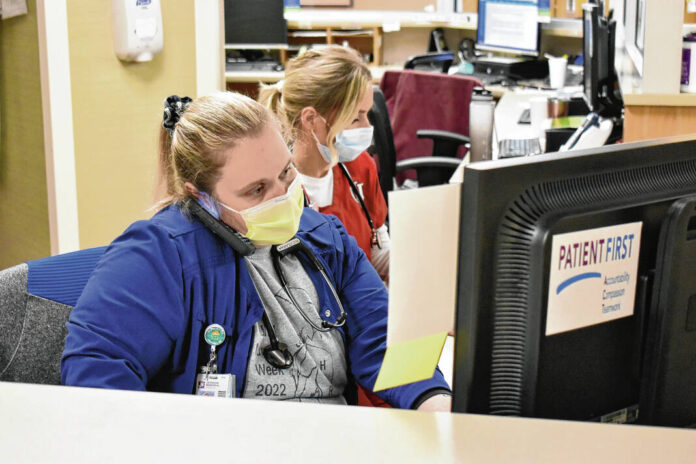The worst may be over for flu activity in Johnson County, but health officials say people should still be on alert for a new coronavirus variant.
At the beginning of December, most of Indiana was experiencing “very high” levels of influenza-like illnesses, or ILI. At Johnson Memorial Health, doctors were seeing near-record high flu admissions at the same time the hospital was dealing with increasing respiratory syncytial virus and COVID-19 cases, officials said.
Fast forward to more than a month later, and this is no longer the case.
“The good news is we’ve seen a decrease in overall respiratory cases really due to a decrease in flu activity in the area,” said Dr. David Dunkle, president and CEO of Johnson Memorial Health.
JMH has seen decreases in admissions and visits to the hospital’s emergency room for the flu. RSV activity has also been decreasing for some time, Dunkle said.
Whether flu and RSV activity has peaked for now is unclear. Since the coronavirus pandemic began, the traditional seasonality of these illnesses has changed, he said.
Despite this, Dunkle hopes the illnesses have peaked for now.
“Typically, after seeing a large number of flu and RSV cases early in the year, hopefully, they have peaked,” he said. “Hopefully, this downward trend will continue.”
Although flu and RSV activity is trending downward locally, COVID-19 activity has continued to be steady, Dunkle said.
“Two weeks ago, I would have told you influenza admissions were much higher than COVID admissions. But that has spilled in the last week,” Dunkle said.
County-wide, hospital admissions for COVID-19 have been steady since September. Around 43 people were hospitalized between September and October, data from the Indiana Department of Health shows.
For November and December, the number rose to the mid to upper 50s. As of Jan. 11, the number stands at 25, data shows.
The number of deaths has also remained relatively low since September, ranging from a high of five to a low of one. As of Jan. 11, at least 622 residents have died from COVID-19, and there has not been a single month since the pandemic was declared where a death wasn’t reported, data shows.
Right now at JMH, officials are seeing a steady number of 3 to 5 people hospitalized with COVID-19, compared to around one person hospitalized for the flu. The vaccination status varied for patients, he said.
“It’s really all over the board, but the majority have either not been vaccinated, or were vaccinated a long time ago and are not up to date with current boosters,” Dunkle said.
While hospitalizations are low, hospital officials are seeing more members of the community becoming ill with COVID-19. JMH has also seen an uptick in employees out with COVID-19-related illnesses. This can put a strain on the hospital, however, as most of the employees have been vaccinated, they are not missing two weeks off of work, he said.
“Given the fact that most are vaccinated, those who do get infected/reinfected with COVID, they tend to have less severe symptoms and are able to return to work faster per CDC guidelines,” Dunkle said.
JMH’s steadiness in COVID-19 cases comes at a time when federal health officials have been raising concerns about an offshoot of the Omicron variant: XBB.1.5. The new sub-variant — which has unofficially been dubbed by health researchers as the “Kraken” — is spreading rapidly throughout the U.S., and made up about 18% of new COVID-19 infections in December, according to the Centers for Disease Control and Prevention and Scientific American.
Both CDC and Dunkle say the sub-variant has become predominant in the United States. Based on early studies, XBB.1.5’s transmissibility is about five times higher than the omicron variant, Dunkle said.
“Hopefully, this will not result in more serious disease or increase hospital admissions,” he said.
Despite the new sub-variant being more transmissible, Dunkle is not as worried about the hospital being overwhelmed with COVID-19 cases, he said.
“I feel that between the number of people who have been vaccinated, and the number of people who have been previously infected, I am not as worried about an unmanageable number of COVID admissions,” Dunkle said.
Health officials expect to continue to hear about new variants for the foreseeable future. The last few years are proof COVID-19 isn’t going away any time soon, Dunkle said.
“All we can do is hope and pray we don’t have another variant that results in more morbidity and death,” he said.
He also hopes that science is able to produce vaccines with more universal coverage. There are several studies going on right now that will not only provide protection against future variants but offer protection for a longer amount of time, he said.
Dunkle encourages people to get vaccinated and get booster shots if they haven’t. By having the vaccines, someone’s chances of being severely ill or hospitalized are greatly reduced, he said.
People should also wear a mask if they have respiratory symptoms of any kind, and follow hand hygiene guidelines, Dunkle said.
“It’s what we’ve said all along,” he said.





